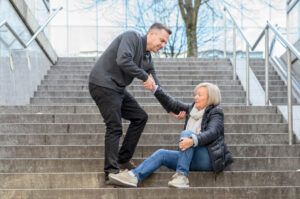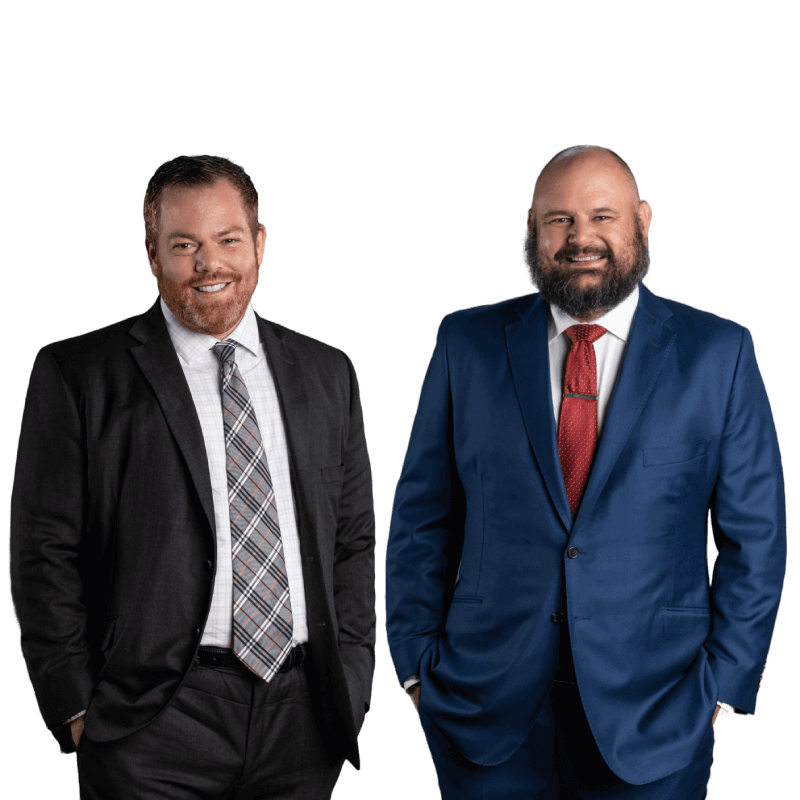It can happen anywhere: a store, a sidewalk, hotel stairs, or a neighbor’s backyard. You slip, and suddenly you fall to the ground. But who is liable for such a slip and fall accident?
There isn’t one single answer, frankly. Liability for a slip and fall depends on where it occurs and who is responsible for it. If you or a loved one suffered from a slip and fall, read on to find out who you might hold liable in your situation. The slip and fall accident lawyer can help you.
Duty of Care and Liability
According to the U.S. Centers for Disease Control and Prevention (CDC), falls are among the most common accidents in the United States. These falls happen at:
Establishments Open to the Public

If the premises are unsafe, the owners and their representatives, such as managers, have arguably breached the duty of care.
Let’s say someone spills a soda in a mall. The floors are already somewhat slick, but the soda makes them even more so. You or a loved one slips and falls because of the liquid, breaking an arm.
The mall managers arguably breached the duty of care owed to the public. The duty of care requires that managers either clean up a potentially unsafe spill or warn the public of the unsafe area by placing cones, tape, or warning signs around it.
If the duty of care in a retail establishment is breached, the owners are arguably liable. Liable means financially responsible for injuries and harm caused directly by the breach of care (and not some other cause). In other words, you can directly approach their insurance companies or them for compensation related to your injuries.
Now, anytime a premise becomes unsafe, a period elapses before it is made safe again. What if owners or managers argued that they did not know about the spill? What if they argue that employees with a mop were on their way when you fell?
In cases like this, the law follows a reasonable person standard. Owners can still bear liability if a reasonable person should have known of an unsafe condition. If the spilled soda remained on the floor for two hours, a reasonably attentive manager and staff likely should have known about it and cleaned it up. But if the spill happened two minutes before your fall and an employee was coming toward it with a mop and bucket? In that case, the owner may have a defense against liability.
Proprietors of establishments open to the public also often bear responsibility for sidewalks and parking lots directly next to their stores. If, for example, you slip on snow or ice on the sidewalk in front of a store, the owner may bear responsibility. The duty of care includes shoveling and icing a potentially dangerous condition.
Slip and falls can happen because of:
- Improperly stocked merchandise
- Broken sidewalks, walkways, or parking lots
- Unsafe floors, including slick, wet, or cracked floors
- Improper or no lighting on stairs or walkways
- Improperly installed and tacked new carpet
- Slippery walkways to pools in hotels
Private Property
Private property owners (such as private homes and yards) may also owe you a duty of care. If they do and breach the duty of care, they may also bear liability.
However, slip and falls on private property are much more complex because the duty of care owners owe folks on private property varies according to the category of visitor in many states.
The following common categories are used in many states.
- Licensee. If you enter private property with permission of the owner (such as a guest), the owner owes you a duty of care. It is to warn you of any dangerous condition that creates a risk of harm if the owner knows about it. Can owners argue that they didn’t know? Yes, that’s a potential defense. Say you fall through rotting boards in a deck, though. Arguably, an unsafe condition like this builds up over time, and the property owner should have been aware. The law follows a reasonable person standard. If a reasonable property owner should have maintained the property better, you can argue that the property owner is still liable in a situation like this.
- Invitee. If you enter the property for a business purpose, such as installing furniture, the owner owes you a duty of care to keep the property reasonably safe.
- Adult trespasser. If you enter someone’s private property without permission, you’re a trespasser. The owner owes you no duty of care if you’re an adult.
However, the duty of care owed trespassers is often slightly different for children. In many states, the law specifies that homeowners must reasonably protect children from something that would attract young children and potentially harm them.
Young children, for example, might be very drawn to an unfenced swimming pool or a ladder that allows them to climb up to a roof and not realize the danger to themselves.
Thus, the property owner owes a duty of care to make such elements safe so the child won’t harm. A swimming pool must be protected so children won’t fall in. A ladder leaning against a house should be removed.
How Do I Receive Compensation for My Injuries?
Slip and fall accidents are a category under premises law. If you’ve been injured due to a breach of the duty of care, the property owner is financially responsible for your injuries. You can either approach the responsible party’s insurance company for compensation of your injuries or bring a civil suit for damages (“Damages” is a legal term for financial compensation).
What Types of Compensation Can I Seek?
Generally, you can seek compensation for:
- Medical bills for doctor’s visits, emergency care and transport, surgery, diagnostic and other tests, prescription medications, hospitalization, physical therapy, and more.
- Lost income from work for money owed you if the accident or necessary care prevented you from working.
- Pain and suffering for physical, psychological, and emotional pain and suffering caused by the incident and the injuries.
What if I Need Future Medical Care?
While some slip and fall accidents result in minor injuries (such as bruises) that will heal relatively quickly, others are extremely serious. The injuries depend very much on multiple factors in the slip and fall, including how far the victim falls, the trajectory of their body, whether and how they hit a floor or other objects, and their existing physical condition.
If you are seriously injured in a slip and fall, you may need medical care over some time. According to the CDC, twenty percent of falls suffered by people over 65, for instance, cause serious injuries such as fractured bones or head injuries. Falls are the most common cause of traumatic brain injury (TBI), and they cause an astounding 95 percent of hip fractures. All of these injuries can require multiple doctor’s visits and surgery.
Victims can seek damages for expected future medical expenses and expenses already incurred. Usually, your medical providers specify what future treatment you will likely need, or a medical expert is consulted about the standard care for the injuries you received. Other experts are consulted about the likely cost of that future care. You are entitled to seek the estimated cost.
How Long Do I Have to Bring a Suit?
If the best solution to your case is bringing a lawsuit, you should know that a court will refuse to hear a case after the statute of limitations is passed. The statute of limitations is a time that starts either on the accident or the date you are first diagnosed with an injury stemming from the accident.
The statute of limitations varies according to state. Talk to a lawyer to find out the period in your state.
While it’s useful to know these periods, victims of slip and fall injuries need to remember that the sooner they bring a suit, the more likely it is to succeed. A long period may cause evidence to become lost, misplaced, or even erased or destroyed.
Evidence in a Slip and Fall Case
Whatever the cause of your injuries, it’s important to have evidence about a slip and fall. It’s especially important in these cases just because the liability often depends on where it occurred, what caused the unsafe condition, and whether the managers rectified the situation.
If you are in a slip and fall, your priority must be your health and safety. If you’re seriously injured, call an ambulance or seek medical attention as soon as possible. Keep all medical treatment records related to those injuries, including dates, diagnoses, and costs. All are evidence.
Whether your injuries are serious or not, see a doctor as soon as possible and explain to them what happened. Sometimes, serious injuries (such as a concussion, which is a form of TBI) are not immediately apparent to you—but medical attention will let you know they’re there and provide you with the necessary treatment.
If you are not seriously injured, there are actions you can take shortly after the incident to provide evidence for any liability cases. They are also good practices to make sure any unsafe areas are fixed.
First, notify the retail establishment’s manager or another responsible party that you’ve slipped and fallen. If they don’t already know that they have a potentially dangerous situation, you’ve alerted them. Make a note that you alerted them.
Of equal importance, if you leave an area without telling a responsible party that you slipped and fell, you risk the responsible party (or their insurance company) questioning whether the accident happened later. After all, if you didn’t say it then, and there is no evidence, what is to prevent them from protecting themselves by averring it didn’t happen?
Second, if you have a smartphone, take pictures of the area. Pictures speak loudly about lack of safety precautions. Pictures make their potential danger clear; document a spill, uneven pavement, holes or cracked floors, darkness, untacked carpet, and uneven flooring.
Third, if there are eyewitnesses to your fall, talk to them and get contact information if possible. Eyewitnesses can provide valuable testimony about what happened.
Fourth, take pictures of your injuries as soon as possible. Take them before bruises fade and lacerations have time to heal. Pictures of injuries are valuable evidence about the nature and extent of the injuries.
Fifth, take notes about what happened soon after the accident. Everyone’s memory fades in time, and notes will help you recall what happened for insurance companies and attorneys.
What if My Loved One Died From Slip and Fall Injuries?
A loved one dying in a slip and fall is a tragedy. A type of lawsuit known as wrongful death is often used if someone has died due to the negligence of another party.
To bring a wrongful death suit, you must most often be the spouse or family member, according to state law. In some states, executors of the deceased estates can bring a wrongful death suit.
Compensation in a wrongful death suit can include medical bills for treatment of injuries incurred before the death, funeral, and burial expenses, and the income or benefits the decedent would have earned from work had they lived.
You can also seek compensation for noneconomic losses, such as emotional pain and suffering, loss of love, affection, and support, and loss of services in the household that the deceased person offered.
If you have any other questions about a slip and fall accident, contact a personal injury attorney near you.


